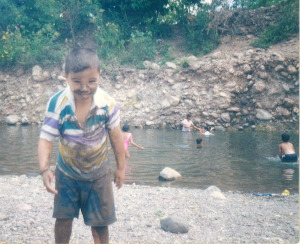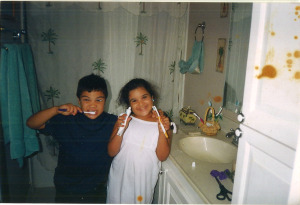Whole New Ball Game: Junior uses football, faith, and family to reset his playbook

By: Austin Anderson
Adrian Diaz burst through the line of scrimmage, past the would be blockers for Iowa City High on the opening Friday night of his junior football season. With his arms extended, he blocked the Little Hawks punt, scooped it up and didn’t stop sprinting until he crossed the goal line. He raised his arms and was swarmed by his teammates after scoring the first touchdown of the season for his Tigers under improbable circumstances. The circumstances weren’t improbable because a blocked punt returned for a touchdown is rare. They were improbable because Adrian Diaz is lucky to be alive.
Born in Honduras, the country with the highest murder rate in the world, Diaz grew up in a house made of mud with his two sisters, four cousins and grandmother. His mother was living in the United States working construction and sending whatever money she could afford back to her family, 900 miles away. His dad left his family before Diaz was born.
Without a father figure, Di az would do anything people told him to do. He threw rocks at cops and was chased throughout the city, swore at his teachers and broke windows.
az would do anything people told him to do. He threw rocks at cops and was chased throughout the city, swore at his teachers and broke windows.
He was so bad that he was expelled from school in the first grade.
Terrified to tell his grandmother, he took the note of expulsion, put it under his grandma’s sewing machine and pretended everything was normal. “She found the note and freaked out. She couldn’t believe it,” Diaz said.
His grandma called his uncle, who normally would come to do the disciplining. Diaz immediately sat down and said the Lord’s prayer in hopes of him not coming to beat Diaz, and perhaps someone was listening, for his uncle never showed up.
In Honduras, if you left any belongings outside overnight, they would not be there the next morning. So when Diaz’s grandmother told him of a place where you could leave your doors opened and your valuables outside, he was intrigued. As far as he knew, the United States was a land of big cities, wealth and kindness. So when his mother called him when he was eight years old and told him to pack his stuff up and move to the United States, she assumed he would be excited. He didn’t want to go and leave his friends and grandmother behind, but eventually, he obliged.
When Diaz and his two sisters arrived in Florida, he was shocked. “It was all swampy, woods everywhere, and I was like ‘what is this?’”
Even though it wasn’t what he was expecting, he was still excited to live with his step-dad (whom he called Dad), his mom and his two sisters. After eating beans and rice nearly every day, he got to try chocolate ice cream and Dr. Pepper for the first time. “It was disgusting,” Diaz said. “My mom said try it, you’ll like it. I tried it and hated it, but now I got used to it and like it.”
The excitement quickly faded away as he started first grade in a new country, without knowing any English. He got made fun of constantly, which started building on the anger he had inside of him, and failed the first grade.
At home he started smelling a weird smell coming from his step-dad’s room as well as 10 plants growing in his backyard. Diaz went to the library and happened to flip to a page in a book that showed the picture of the plant that was growing in his backyard. It was marijuana and his step-dad ha d been growing it and smoking it regularly.
d been growing it and smoking it regularly.
When Diaz was nine, he refused to do the dishes. His step-dad, filled with rage, started beating him with a computer cord until his eye started to bleed. His mom tried stepping in, but his step-dad grabbed her and started to choke her against the wall. Diaz needed to do something to help his mom, so he went and grabbed a knife and held it at his step-father. His step-dad let his mom go, then grabbed the knife out of Diaz’s hands and told him if he ever did that again he was going to use it on him. “I was heartbroken. I couldn’t believe this was my life,” Diaz said.
Diaz’s step-father would often go out hunting and return late at night or in the early morning, but one time he didn’t come home. He had been arrested, and in order to avoid jail time, he and Diaz’s mother fled back to Honduras, leaving Diaz and his sister alone with their older sister, who was barely 19. “She said she was done with us,” he said with a quiver in his voice.
While in Honduras, his step-dad beat up Diaz’s mom, cheated on her and cut up her passport so she couldn’t return home to her kids in the United States. Meanwhile, Diaz had moved from Florida to Virginia to Indianapolis back to Virginia and then back to Florida where he reunited with his mother after she ended it with her husband.
In Florida is where Diaz hit the lowest point of his life. He started hanging out around kids who did drugs and drank alcohol, and he slipped right into that lifestyle. He skipped weeks of school at a time, but when he did go, he would stare at a wall and do nothing or intentionally get into fights with the other kids. “My heart was filled with so much darkness that I would come to school and want to fight.”
Diaz got in the face of a member of the Bloods and started a fight. Afterwards he was in the principal’s office crying and apologizing. “To tell you the truth, I don’t think I was sorry. I just wanted to get out of the situation,” he said.
The next day that kid came up to Diaz in the streets and lifted up his shirt. revealing a gun attached to his hip. “I didn’t know what to do,” Diaz said. “I was paralyzed when I saw the gun.”
His role model Joe, who got Diaz into weight lifting and refrained from drugs and alcohol, talked the kid out of using the gun on Diaz. He wasn’t shot, a fate that two of Diaz’s uncles couldn’t avoid in Honduras as they were involved with drug cartels and killed.
Diaz would spend months away from home, staying nights at Joe’s house, but not before long, even his role model started using drugs, drinking alcohol and using weapons.
After a year of living in Florida, his uncle gave his mother’s phone number to a man he worked with. After a few months of talking on the phone and never meeting in person, his mother packed up and moved to Iowa to live with his uncle and be closer to her mom’s new boyfriend. Diaz wasn’t happy about his mom choosing a guy over her kids again and threatened to “beat him up if he ever tried to talk to me.”
In Iowa, Adrian was able to release some of the anger he had built up through sports. The first sport he tried his hand at was wrestling. While wrestling coach Will Carter, Adrian shot a double leg takedown that Carter described as the best double he’d ever had shot against him in all his years of coaching. Carter, who doubled as the freshman football coach at the time, then easily convinced Diaz to go out for football even though he had never played before. “I didn’t see more challenges with Adrian than you do with any other freshman except for the fact that we were not just adding on to the knowledge, we were starting the foundation,” Carter said.
Diaz immediately started at both fullback and linebacker on the freshman team due to his talent and work ethic displayed by the many early morning weight room sessions he attended. “Anyone coming in at 5:45 a.m. on a consistent basis shows great work ethic. When Adrian sets goals, he usually gets them,” Carter said.
Even after replacing the bad in his life with sports, Diaz still didn’t feel like himself. At home, Diaz’s uncle held that he was giving them a place to live over their heads. He would call his mom a bad mother and one day Diaz just lost it. “I took off my shirt. Something came over me. I have never been that pissed.”
After his uncle refused to fight, Diaz sprinted outside through the snow and cold without a shirt on and fell to his knees in the barn as tears streamed down his face and asked God, “Why is it always about money?”
After that, Diaz’s PE teacher, Corey Peters, invited him to attend a Fellowship of Christian Athletes (FCA) meeting that Peters was in charge of. “I was impressed with his work ethic and his humility. Adrian has a huge heart. That is a gift from God. It needed a little dusting off. He was living in a very stressful environment. He was carrying some significant hurts and scars,” Peters said.
Diaz didn’t really want to go and skipped the first meeting Peters told him to go to. However, Diaz ended up going to the next meeting, a meeting that would change his life forever. Diaz gave himself to Christ that night and has never looked back to his old life since. “I felt like I was on clouds. I couldn’t breath. It was crazy. I’ve never felt that way. Every detail in the room was so bright. I was so happy.”
He continued to go to FCA and discovered that he and Peters have had a similar childhood. Peters’ biological father left his family, choosing not to be in their lives, and moved to Oregon. He often acted out and got into trouble in school. When he went to live with his father in Oregon for a period of time, he discovered his father was into drugs, and he was living in a drug house. But after digging into the Bible, he discovered a forgiving God that would change him forever.
After many FCA meetings, Peters’ family dinners and work in the community, Peters’ became the father Diaz always wanted. “I still go hang out with his family. They love me very much. His son and daughter think I am their brother. They check up on me every day, ‘Adrian, do you need this. Do you need that?’”
Together they have gone into rough communities and given a wheelchair to someone who didn’t have one, given diapers to a single mom who had her last diaper on her baby and didn’t know where the next one was coming from. The only package of diapers they had left was the exact size she needed. They saw a former prison inmate who was screaming at people and getting ready to fight start to cry and hug them because they offered prayer to him. They even accompanied each other to Chicago to go to tough neighborhoods and hand out over 450 basketballs.
For as much as Peters has helped Diaz, Diaz has helped Peters just the same. “I have learned so much from Adrian and his family. I have learned about their culture, and I am reminded how powerful love is. Powerful enough to turn an entire family around.”
As he finishes retelling this, Diaz wipes the tears away from his watery eyes. His black framed glasses lay on the wooden table instead of covering up the slight indent he has on his forehead, not from any near death experiences, but from an accident that occurred jumping on the bed. After constantly asking God “why” all his life, he finally understands the true meaning of “everything happens for a reason.” With his dreams of creating a world filled with love, being a role model for kids, positively impacting the world and possibly being a preacher someday, the story of triumph and tragedy authored by Adrian Diaz isn’t coming to an end. It is just beginning.







1 Comment
You must be logged in to post a comment Login